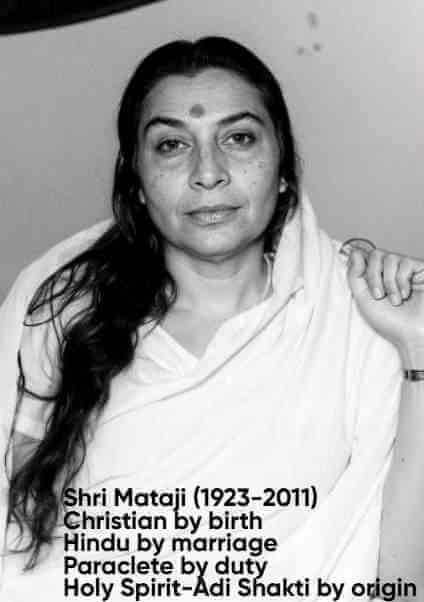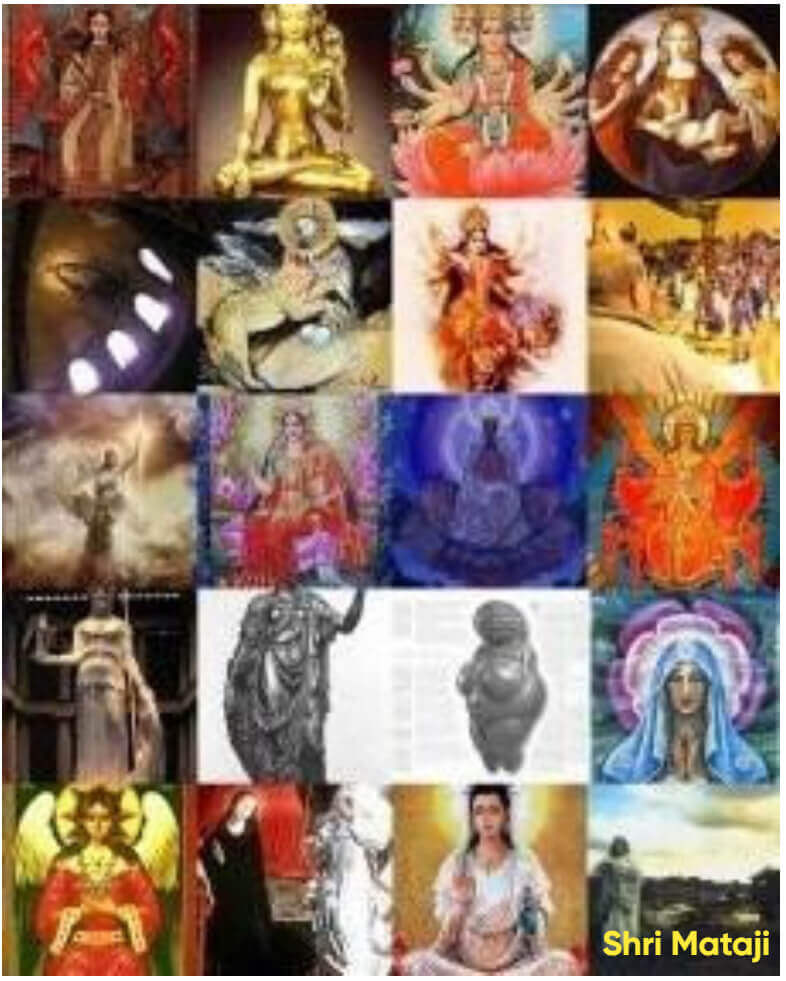Aakhan Jor and Brahman: The Great Surrender to the Ultimate Reality
This forum post explores the profound meaning of Aakhan-Jor in the context of Sahaja Yoga and Sanatana Dharma. It reflects on the surrender to WaheGuru as the ultimate recognition of Divine Power—beyond speech, thought, and worldly control. Through scriptural verses, meditative insight, and philosophical inquiry, the post reveals how true spiritual progress arises from humility, devotion, and the art of questioning. It emphasizes that God is not merely to be petitioned, but experienced directly through meditation and inner silence. The teachings of Shri Mataji and the wisdom of Dharma converge to illuminate the path of Self-Realization and the eternal nature of Brahman.
July 30, 2010Dear people of Spirit,
Namaste - i bow to Brahman who resides in you!
Brahman is unlike the gods of the masses. Having said that, Brahman is the gods of the masses and pervade their holy scriptures. That is why this quote makes so much sense:
Great indeed are the devas who have sprung out of Brahman. — Atharva Veda
Essentially, it is also beyond being and non-being alike, and thus does not quite fit with the usual connotations of the word God and even the concept of monism. For this reason, some authors use the word 'Godhead' for Brahman, to distinguish it from the usual usage of the word 'God'. To call this concept 'God' would be imprecise. The closest interpretation of the term can be found in the Taittariya Upanishad where Brahman is described in the following manner:
satyam jnanam anantam brahman
"Brahman is of the nature of truth, knowledge and infinity"
Thus, Brahman is the origin and end of all things, material or otherwise. Brahman is the root source and Divine Ground of everything that exists, and does not exist.”
The Mother entrenched in all scriptures is Brahman, and the Sure Signs and Great News of the Last Judgment and Resurrection—the heart and soul of the Torah, Bible and Koran—testifies to that. Brahman is unlike the individual gods of the masses, but their sum ........ and far, far, far more.
i remember way back in 1993 requesting to know God Almighty, and not the gods of the masses.
"O Speak Almighty God!
Only God Almighty, would be able to account for all the Messengers sent down to Earth. His Religion had to be Universal, preached by all His Messengers and found in all His Holy Scriptures. He had to be the Ultimate Reality — His Truth had to be All Pervading, All Encompassing, Unchangeable, Indestructible, Flawless and Absolute.
This spiritual song imploring the Almighty Creator—The Universal Soul— to remove the veil of ignorance was sung again, and again, and again:
O Ek suki yaha lakoh mein.
O Only one in a hundred thousand is in bliss.
Ansoo hai croroh ankhoh mein.
There are tears in millions and millions of eyes.
Hum neh gin gin har takdir dekhi.
I have counted and seen every fate for years,
Ek hasta hai dush rote hai
Only one soul laughs while ten are in tears.
Kuch bhol Prabhu yeh kya Maya
O! Speak Almighty God what is this Illusion,
Tera khel samaj meh nah aya
Your Divine Play is all confusion and delusion.
For weeks the Almighty Creator was asked, amid a profusion of tears, to reveal the Truth. Repeatedly He was implored to answer the meaning of life, creation, and this useless, empty human existence. Above all, He was begged for the Truth that would destroy the falsehood that the religious regimes had deluded him and the rest of humanity. What was desired was the Absolute Truth of the Absolute Creator, not the conflicting gods of various organized religions. Any god that could not explain and account for the other Messengers was not God. Any yahweh that only cared for his kind was not Yahweh. Any allah that had only one messenger was not Allah. Any prabhu that was found only in a single scripture was not Prabhu. Any buddha that had no Knowledge of His Kingdom was not Buddha.
The Supreme Creator had to be the Lord of all Messengers that came on Earth. His Truth had to be found in all Scriptures that humans possessed. His Reality had to be Absolute, Irrefutable, and All Compassing. Then, and only then, will be be acknowledged as God the Almighty.”
SHRI ADI SHAKTI: THE KINGDOM OF GOD, 1999, page 50
https://adishakti.org/introduction.htm
Today, 7-28-2010, i know without a shadow of doubt that God Almighty is verily Brahman. There is no temple, gurdwara, synagogue, church, or mosque dedicated to Brahman since IT cannot be worshipped. Brahman is _not_ the gods of the masses as IT"Is not an object of prayer, but of meditation and knowledge.” Brahman"can be understood only through direct spiritual experience.” No guru, except The Mother, would ever be capable of giving the meditation, knowledge and experience required for this summum bonum of Truth.
IT is the summum bonum of Truth ...... past, present and future! That is the only way to describe the supreme importance of Brahman, the singular and ultimate end which human beings ought to pursue at any cost or sacrifice. Brahman is the End of all Sacred Knowledge, the end of all spiritual searching, and an end in itself. IT"Is not an object of prayer, but of meditation and knowledge.” IT"can be understood only through direct spiritual experience.” IT is the tour de force in the pursuit of enlightenment.... past, present and future!
regards to all,
jagbir
Aakhan Jor and Brahman
Introduction
Aakhan‑Jor — the Great Surrender to WaheGuru — opens the heart completely, allowing the seeker to ask and listen. When this surrender is extended toward Brahman, we move beyond the gods of the masses into the infinite, eternal, indescribable substratum of all existence.
Brahman: The Ultimate Ground of Being
Brahman is not an object of prayer; it is an object of meditation and direct knowledge. As the Taittiriya Upanishad teaches:
“Satyam jnanam anantam brahman” — Brahman is of the nature of truth, knowledge, and infinity.
It is eternal, genderless, omnipresent, and the source from which the devas arise:
“Great indeed are the devas who have sprung out of Brahman.” — Atharva Veda
Shri Mataji, the Paraclete, affirmed:
“Now, the principle of Mother is in every, every scripture — has to be there!” (Radio Interview, Santa Cruz, 1983)
Brahman transcends ritual and form and is accessible only through direct spiritual experience.
The Practice of Aakhan‑Jor
Aakhan‑Jor is the active surrender of ego, mind, and heart to the Divine. It is a living, two-way relationship:
- Honest Invocation: Speak your doubts and questions to the Divine without adornment.
- Sincere Posture: Sit humbly in meditation, offering yourself fully.
- Patient Silence: Listen attentively for subtle guidance within.
- Discerned Action: Act upon insights that arise, allowing guidance to transform your life.
“Through prayer, we are communicating our concerns to God, and through meditation, we are allowing God to reveal Himself to us. Thus, the communication is a two-way street, and not a one-way monologue.”
From Surrender to Direct Experience
The cry of the soul for the Absolute is universal. Jagbir recounts:
“Only God Almighty would be able to account for all the Messengers sent down to Earth. His Religion had to be Universal, preached by all His Messengers and found in all His Holy Scriptures. He had to be the Ultimate Reality — His Truth had to be All Pervading, All Encompassing, Unchangeable, Indestructible, Flawless and Absolute.”
This points to Aakhan‑Jor’s heart: surrendering not to limited deities but to the Universal Soul, Brahman, through Shri Adi Shakti who grants the meditation, knowledge, and direct experience revealing the ultimate Reality.
Fruits of Surrender and Realization
- Resolution of inner doubts and contradictions.
- Deep trust in the Divine beyond dogma.
- Clarity regarding the self and reality.
- Direct experience of the Divine Ground present in all scriptures and messengers.
Universal Resonance
The pattern of surrender, asking, listening, and receiving guidance echoes across traditions:
- Christian contemplatives: abandonment to Divine Will.
- Sufi mystics: reliance on God (*tawakkul*) and remembrance (*dhikr*).
- Bhakti practitioners: devotional dialogue with God.
- Advaita seekers: recognition of the non-dual Self.
Aakhan‑Jor, in its fullest expression, leads to direct experience of Brahman, the Mother entrenched in all scriptures, the Ultimate Reality.
Conclusion
To practice Aakhan‑Jor is to ask with purity, listen with humility, and surrender with devotion. To realize Brahman is to encounter the summum bonum of Truth, beyond worship, beyond form, beyond prayer — known only through direct spiritual experience.
Har Har WaheGuru. Namaste to Brahman in all beings.


